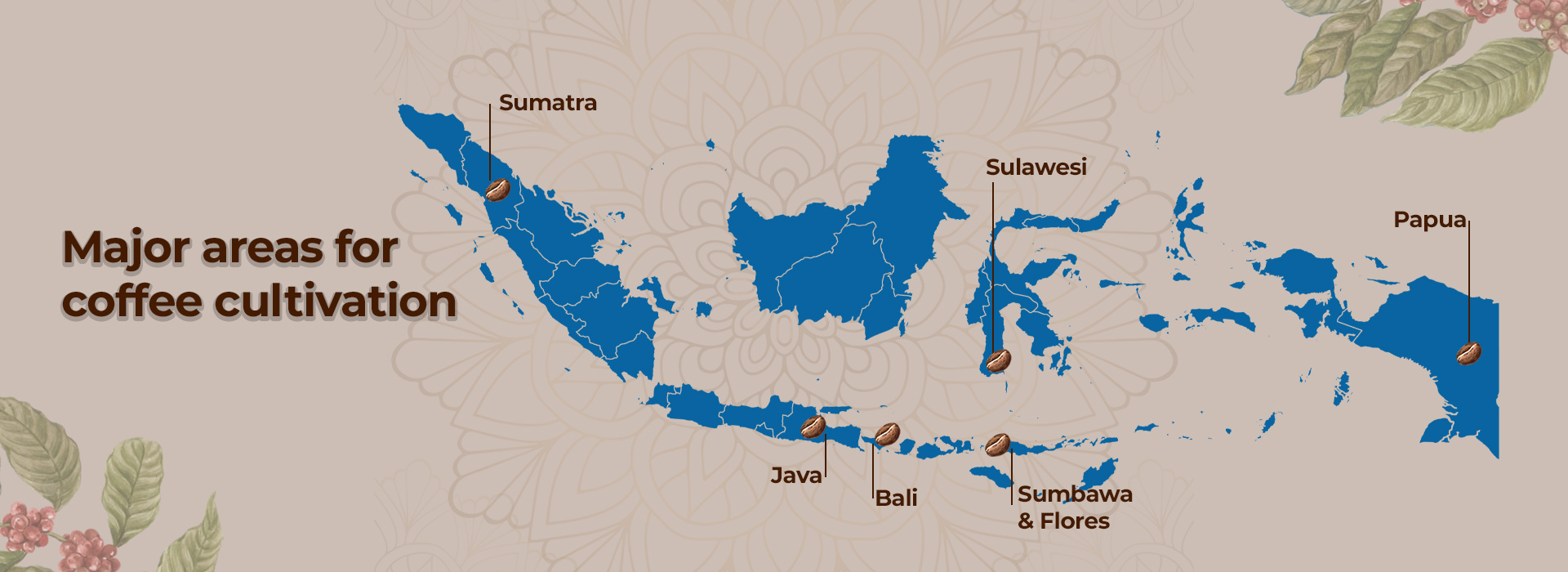Coffee Beans of Indonesia
Indonesia is the fourth-largest coffee producer in the world after Brazil, Vietnam and Colombia. Coffee cultivation in Indonesia started in West Java in the late 17th century in the early Dutch colonial period, and has since played an important part in the country’s growth and development. Indonesia is well-suited for coffee plantations, since geographically it is located near the equator and with many mountainous regions on the main islands, creating perfect microclimates for the growth and production of coffee beans.
Major areas for coffee cultivation
According to USDA’s Gain Report, Indonesia produced 10.6 million bags (about 650,000 tonnes) in 2018/2019. More than 90% of Indonesia’s coffee beans are cultivated by small-scale farmers with relatively small plantations of around 1-2 hectares each. These are main areas for growing coffee beans in Indonesia:
- Sumatra
Sumatra is the largest coffee-producing region in Indonesia, producing up to 75% of the country’s coffee beans. The three well-known regions are Mandailing, Lintong and Gayo in North Sumatra. - Sulawesi
The primary region for Arabica production covers the Toraja highlands in South Sulawesi. The regions of Mamasa and Gowa also produce Arabica, although they are less well-known. - Java
Nowadays the coffee plantations in Java produced mainly the higher-valued Arabica variety. The production is centered on the Ijen Plateau, East Java, at an altitude of more than 1,400 meters. - Bali
The highland region of Kintamani is the main coffee-growing area on Bali. Many coffee farmers on Bali grow organic coffee, or at least use organic fertilizers without agrochemicals. - Sumbawa and Flores
The western slopes of Mount Tambora is the main coffee-growing area in Sumbawa island, while coffee from Flores is grown at 1,200 to 1,800 meters on hillsides and plateaus. - Papua
Coffee beans from Papua come from Baliem Valley and Kamu Valley, both areas lie at altitudes between 1,400 and 2000 meters. Chemical fertilizer pesticide and herbicide are unknown in these areas, which makes the coffee both rare and valuable.
Coffee Bean Varieties
Coffee beans in Indonesia consist of arabica, robusta and liberica, with robusta making up about 80% of the country’s coffee production. About 25% of Indonesia’s coffee beans export is Arabica beans, and the balance is Robusta. The Liberica beans are produced in limited number by certain areas mainly in Sumatra.
In general, Indonesia's Arabica coffee varieties have low acidity and strong bodies, which make them ideal for blending with higher-acidity coffees from Central America and East Africa. The Robusta variety is grown at lower altitude than the Arabica, the resulting beans are used in instant coffee and other manufactured products.
The most unusual form of coffee processing in Indonesia is “kopi luwak”. This coffee is processed by the Asian palm civet (Paradoxurus hermaphroditus) that eat ripe coffee cherries and process the fruit in their digestive system. The discarded coffee beans are collected and washed. Due to the fermentation process inside the stomach, and also the fact that the civet chooses only the best quality cherries, the result is a smooth, mild cup, with a sweet after-taste. Kopi luwak is very rare and expensive.
The Future of Coffee in Indonesia
Domestic consumption of coffee continues to rise due to strong demands for ready-to-drink coffee products and the expansion of coffee retail outlets. According to the data from the Association of Indonesian Coffee Exporters (AEKI), the Government is working closely with Indonesian farmers on a plan to expand Indonesia's coffee plantations, while rejuvenating old plantations through an intensification program.
Due to increasing global and domestic demand, a significant improvement in the country's coffee sector is needed. Not only to increase the quantity of coffee beans, but also to enhance the technological innovations in coffee processing. Hopefully this will result in the increase of the value of Indonesia’s coffee beans in the global market.
Category: All About Indonesia and Coffee
Tags: Berto Roasters, Coffee Bean Indonesia
By: KUMO Studio / Mar 2020

